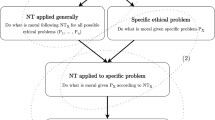Abstract
In its classical conception, game theory aspires to be a determinate decision theory for games, understood as elements of a structurally specified domain. Its aim is to determine for each game in the domain a complete solution to each player's decision problem, a solution valid for all real-world instantiations, regardless of context. “Permissiveness” would constrain the theory to designate as admissible for a player any conjecture consistent with the function's designation of admissible strategies for the other players. Given permissiveness and other appropriate constraints, solution sets must contain only Nash equilibria and at least one pure-strategy equilibrium, and there is no solution to games in which no symmetry invariant set of pure-strategy equilibria forms a Cartesian product. These results imply that the classical program is unrealizable. Moreover, the program is implicitly committed to permissiveness, through its common-knowledge assumptions and its commitment to equilibrium. The resulting incoherence deeply undermines the classical conception in a way that consolidates a long series of contextualist criticisms.
Similar content being viewed by others
REFERENCES
Aumann, R.: 1974, ‘Subjectivity and Correlation in Randomized Strategies’, Journal of Mathematical Economics 1, 67–96.
Aumann, R.: 1976, ‘Agreeing to Disagree’, Annals of Statistics 4, 1236–1239.
Aumann, R.: 1981, ‘Survey of Repeated Games’, in Essays in Game Theory and Mathematical Economics in Honor of Oskar Morgenstern, Wissenschaftsverlag, Bibliographisches Institut, Mannheim, Vienna and Zurich, pp. 11–42.
Aumann, R.: 1987a, ‘Correlated Equilibrium as an Expression of Bayesian Rationality’, Econometrica 55, 1–18.
Aumann, R.: 1987b, ‘Game Theory’, in M. Milgate and P. Newmann (eds.), The New Palgrave: A Dictionary of Economics, Vol. 2, The Stockton Press, New York, pp. 460–82.
Aumann, R.: 1992, ‘Irrationality in Game Theory’, in A. P. Dasgupta (ed.), Economic Analysis of Markets and Games, MIT Press, Cambridge, Mass., pp. 214–227.
Aumann, R. and Brandenburger, A.: 1995, ‘Epistemic Conditions for Nash Equilibrium’, Econometrica 63(5), 1161–1180.
Bacharach, M.: 1992, ‘The Acquisition of Common Knowledge’, in C. Bicchieri and M. L. D. Chiara (eds.), Knowledge, Belief and Strategic Interaction, Cambridge University Press, Cambridge, pp. 285–316.
Bernheim, B. D.: 1984, ‘Rationalizable Strategic Behavior’, Econometrica 52, 1007–1028.
Bernheim, B. D.: 1986, ‘Axiomatic Characterization of Rational Choice in Strategic Environments’, Scandinavian Journal of Economics 88, 473–488.
Bicchieri, C.: 1989, ‘Self-refuting Theories of Strategic Interaction: A Paradox of Common Knowledge’, Erkenntnis 30, 69–85.
Brandenburger, A.: 1992, ‘Knowledge and Equilibrium in Games’, Journal of Economic Perspectives 6(4), 83–101.
Brandenburger, A. and Dekel, E.: 1987, ‘Rationalizability and Correlated Equilibria’, Econometrica 55, 1391–1402.
Brandenburger, A. and Dekel, E.: 1989, ‘The Role of Common Knowledge Assumptions in Game Theory’, in F. Hahn (ed.), The Economics of Missing Markets, Information and Games, Clarendon Press, Oxford, pp. 46–61.
Chernoff, H.: 1954, ‘Rational Selection of Decision Functions’, Econometrica 22, 422–443.
Harsanyi, J. C.: 1977, Rational Behavior and Bargaining Equilibrium in Games and Social Situations, Cambridge University Press, Cambridge.
Harsanyi, J. C.: 1992, ‘Game Solutions and the Normal Form’, in C. Bicchieri and M. L. D. Chiara (eds), Knowledge, Belief, and Strategic Interaction, Cambridge University Press, Cambridge, pp. 355–376.
Harsanyi, J. C. and Selten, R.: 1988, A General Theory of Equilibrium Selection in Games, The MIT Press, Cambridge, Mass. and London.
Kreps, D. M., Milgrom, P., Roberts, J. and Wilson, R.: 1982, ‘Rational Cooperation in the Finitely Repeated Prisoners' Dilemma’, Journal of Economic Theory 27, 245–252.
Lewis, D. K.: 1969, Convention: A Philosophical Study, Harvard University Press, Cambridge, Mass.
Luce, R. D. and Raiffa, H.: 1957, Games and Decisions, John Wiley and Sons, New York.
McClennen, E.: 1992, ‘The Theory of Rationality for Ideal Games’, Philosophical Studies 65, 193–215.
McClennen, E. F.: 1976, ‘Some Formal Problems with the von Neumann and Morgenstern Theory of Two-Person, Zero-Sum Games, i: The Direct Proof’, Theory and Decision 7, 1–28.
McClennen, E. F.: 1978, ‘The Minimax Theory and Expected Utility Reasoning’, in J. L. C. Hooker and E. F. McClennen (eds.), Foundations and Applications of Decision Theory, Vol. I, R. Reidel, Dordrecht.
Nash, J. F.: 1951, ‘Noncooperative Games’, Annals of Mathematics 54, 286–295.
Pearce, D.: 1984, ‘Rationalizable Strategic Behavior and the Problem of Perfection’, Econometrica 52, 1029–1050.
Pettit, P. and Sugden, R.: 1989, ‘The Backward Induction Paradox’, The Journal of Philosophy 86(4), 169–182.
Reny, P. J.: 1992, ‘Rationality in Extensive-Form Games’, Journal of Economic Perspectives 6(4), 103–118.
Rubinstein, A.: 1992, ‘The Electronic Mail Game: Strategic Behavior under “Almost Common Knowledge” ’, in C. Bicchieri and M. L. D. Chiara (eds.), Knowledge, Belief, and Strategic Interaction, Cambridge University Press, Cambridge, pp. 317–326.
Schelling, T. C.: 1960, The Strategy of Conflict, Harvard University Press, Cambridge, Massachusetts.
Spohn, W.: 1982, ‘How to Make Sense of Game Theory’, in W. Stegmuller, W. Balzer and W. Spohn (eds.), Studies in Contemporary Economics, Vol. 2: Philosophy of Economics, Springer-Verlag, Berlin, Heidelberg, New York.
Sugden, R.: 1995, ‘A Theory of Focal Points’, The Economic Journal 105, 533–550.
von Neumann, J.: [1928] 1959, ‘On the Theory of Games of Strategy’, Annals of Mathematics Studies (40), 13-42. Trans. Sonya Bargmann.
von Neumann, J.: [1928] 1963, ‘Zur Theorie der Gesellschaftsspiele’, in A. H. Taub (ed.), Collected Works, Vol. VI, Pergamon Press, Oxford, pp. 1–26.
von Neumann, J. and Morgenstern, O.: 1953 [1944], Theory of Games and Economic Behavior, third edn., Princeton University Press, Princeton.
Author information
Authors and Affiliations
Rights and permissions
About this article
Cite this article
Sensat, J. Game Theory and Rational Decision. Erkenntnis 47, 379–410 (1997). https://doi.org/10.1023/A:1005324312413
Issue Date:
DOI: https://doi.org/10.1023/A:1005324312413




